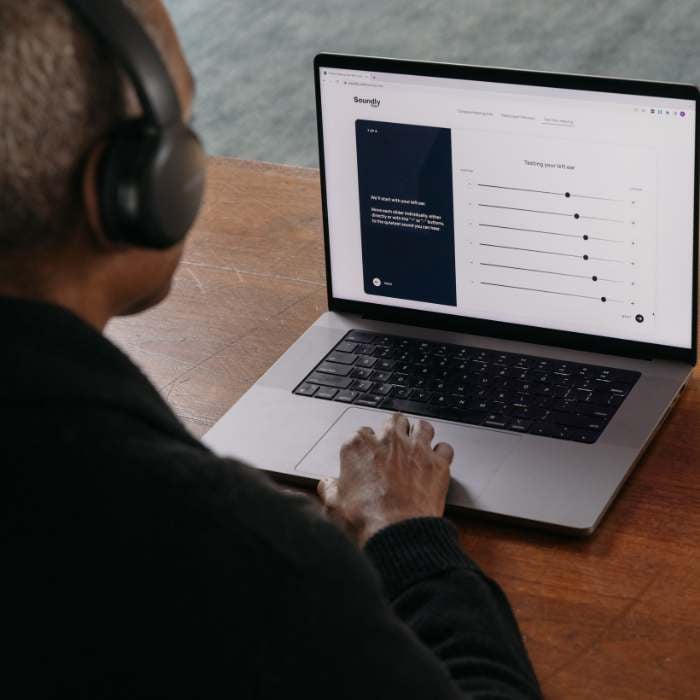If you’ve been putting off a hearing test, I get it. I did the same thing for years. The idea of sitting in a clinic and being told I needed hearing aids felt like more than I was ready for.
What I wish I’d known sooner is that you can start with an online hearing test. These tests aren’t perfect, but they’re surprisingly accurate and only take a few minutes with headphones and a quiet room.
We tried more than 20 online hearing tests to see which ones actually work and which ones fall short. Here are the five that gave the clearest, most helpful results.
Prepare for your at-home test.
Getting ready the right way makes a big difference in how accurate your results will be.
Treat this like a mini appointment — give yourself a few minutes to set up, get comfortable, and remove distractions before you start.
- Use headphones or earbuds - Skip computer speakers. Any good pair (Bose, AirPods, JBL, Sony, etc.) will work — as long as they’re in good condition.
- Check your setup - Make sure your headphones are connected and working before you begin. A quick sound test saves you frustration later.
- Pick the quietest spot you can - Turn off TVs, appliances, and fans. Even traffic noise or AC hum can affect results. A closet or small, soft-furnished room works well.
What At-Home Tests Can’t Do
At-home tests are great for screening your hearing, but they can’t replace a full exam. You won’t get:
- Otoscopy (looking inside your ear)
- Bone conduction testing
For a complete picture of your hearing health, you’ll still need an in-person visit with an audiologist.
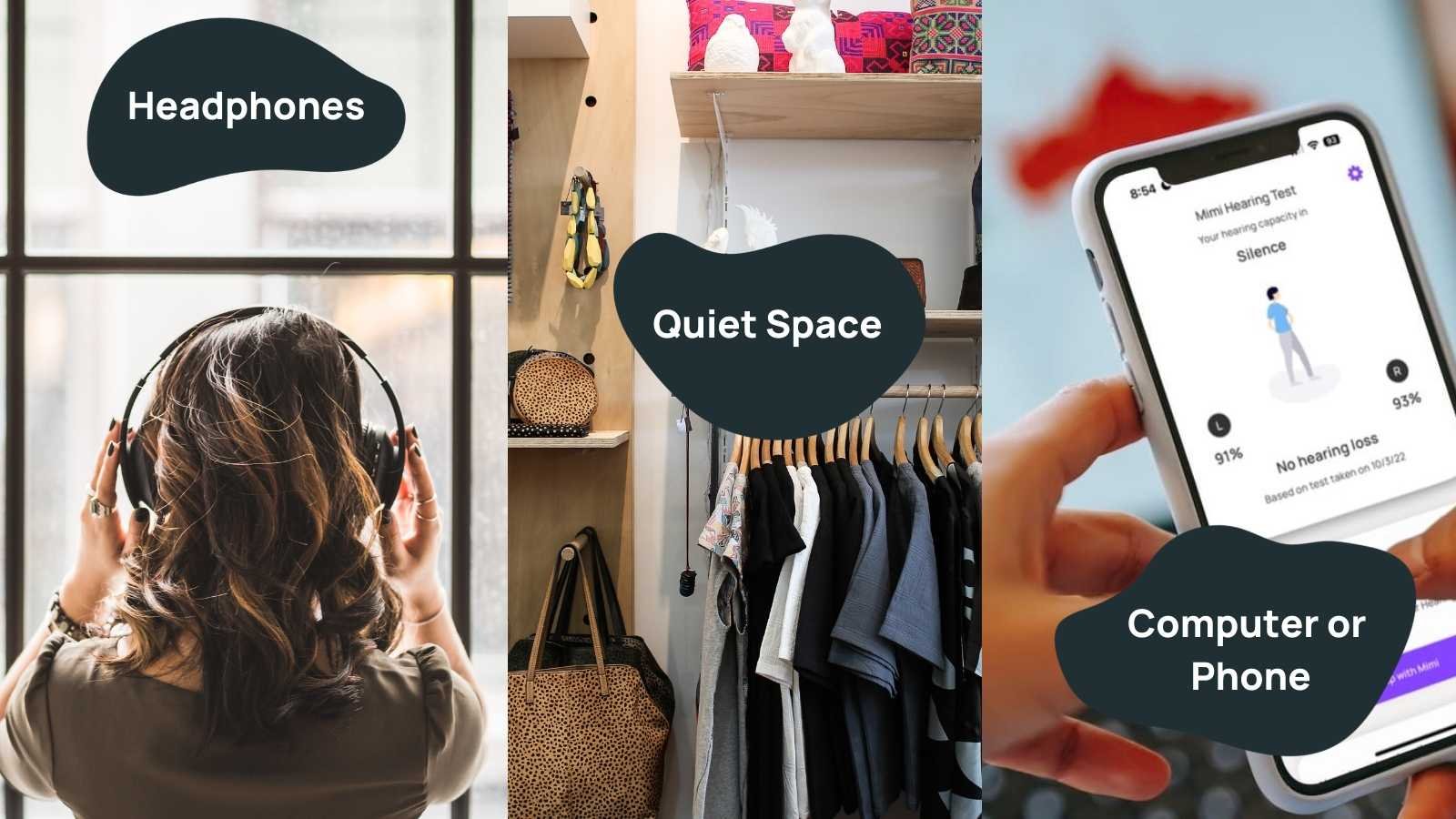
With that out of the way, let's jump into our top 5 online hearing tests.
Summary of Results
Here's a summary of our favorite online tests. Keep scrolling for a full breakdown of each (along with screenshots).

#1 Soundly - Best Overall
We like the interface and audiogram style chart.
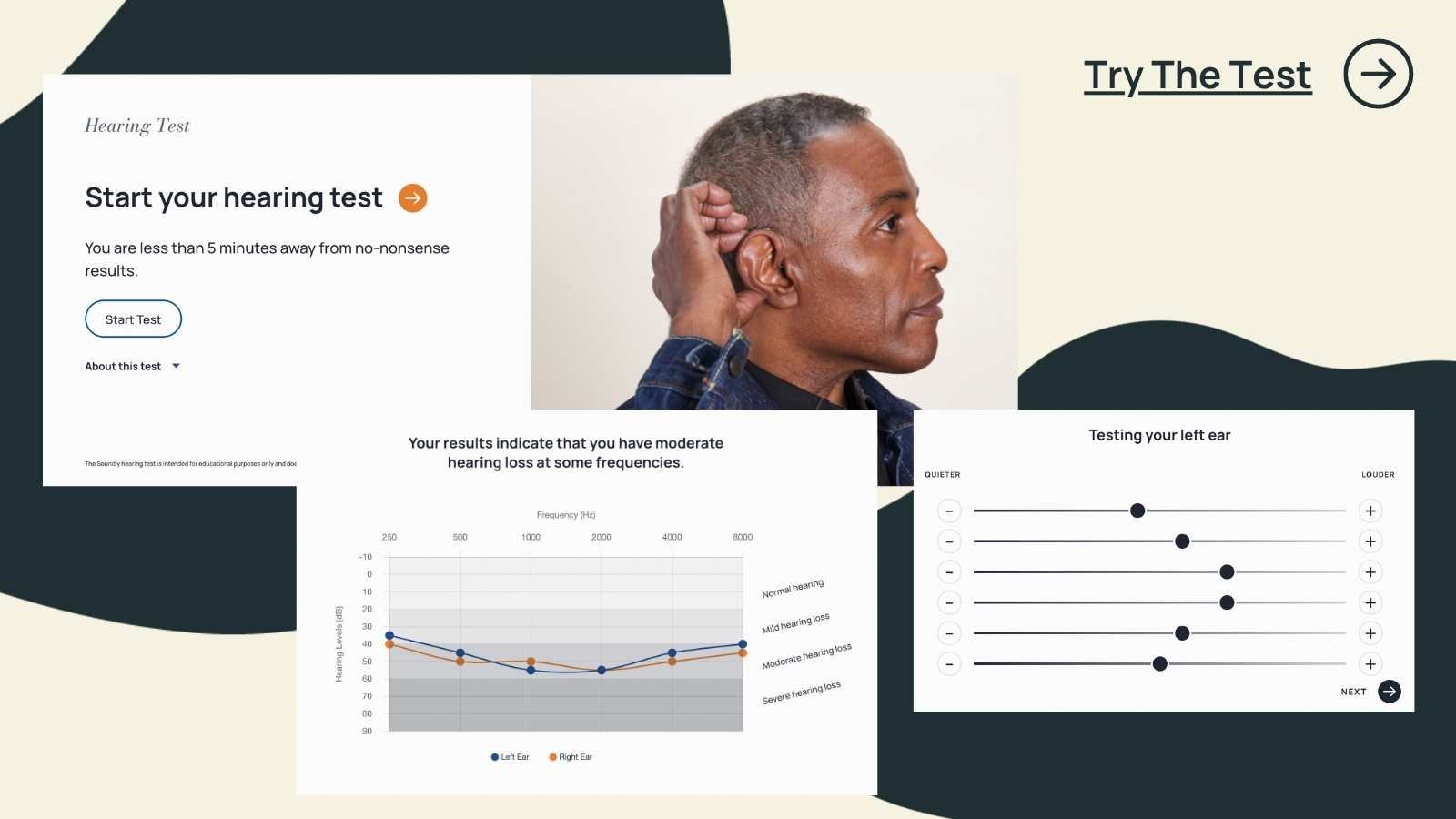
After trying every online hearing test we could find, we noticed something was missing. We wanted a simple, accurate test that produced an audiogram-style chart—just like you’d get at an audiologist’s office.
The Soundly test was built in collaboration with a PhD sound engineer, a team of skilled web developers, and our in-house audiologists.
It’s been featured in the LA Times, Forbes, CNET, and more. To date, the test has been taken more than 100,000 times.
We’ve also added helpful features like an AI assistant that explains your results and the option to have someone from our team review your test with you.
We hope you find it useful!
Try The Soundly Test

#2. Jabra Enhance - Best Custom User Experience
We like the custom video results.
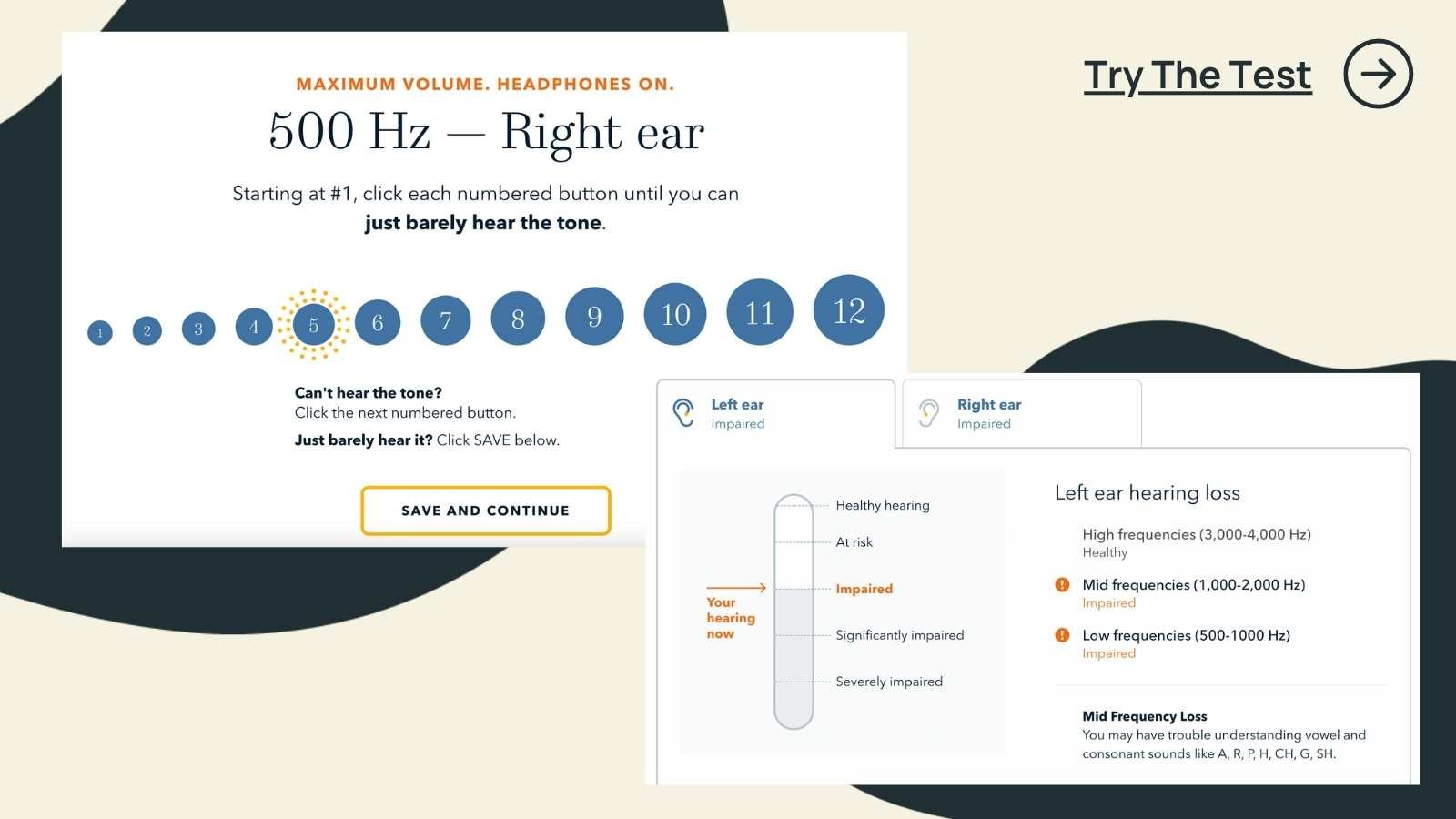
Jabra Enhance Plus is a well-known hearing aid brand that offers remote programming and home delivery of its products. As a company that specializes in remote testing and care, their online hearing test is top-notch.
The interface is straightforward and involves increasing the volume until you can hear each tone. In addition to providing detailed information about your hearing loss, Jabra's test also includes a personalized video based on your test results.
If you are interested in learning more about your hearing loss, it is worth giving Jabra's test a try.
Try The Jabra Enhance Test

#3. Eargo - Best Sound Calibration
We like the built-in sound calibration process and questionnaire.
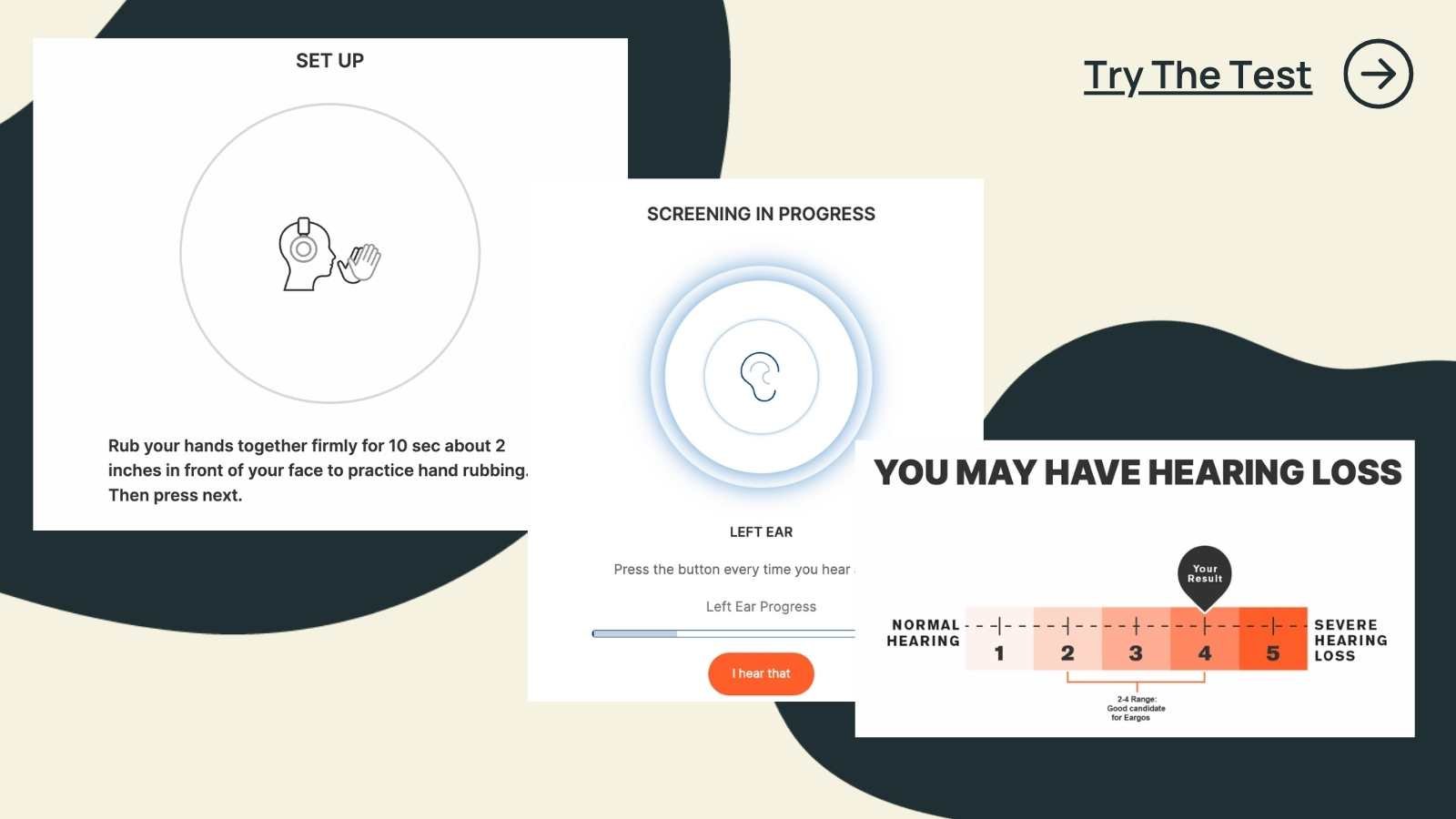
Before you begin the test, Eargo prompts you to rub your hands together and calibrate a sound in your headphones to match. This step ensures that you have your volume at the right level.
The test asks a series of lifestyle questions that might help you understand your hearing loss. Eargo then plays a series of tones to test the softest sounds you can hear.
The final hearing test result is a simple chart that categorizes your hearing loss as mild, moderate, severe, or profound. This test does not give you a traditional audiogram chart, but it does provide an understandable overview.
Try The Eargo Test

#4. Audicus - Most In-Depth Test
We like the in-depth approach.
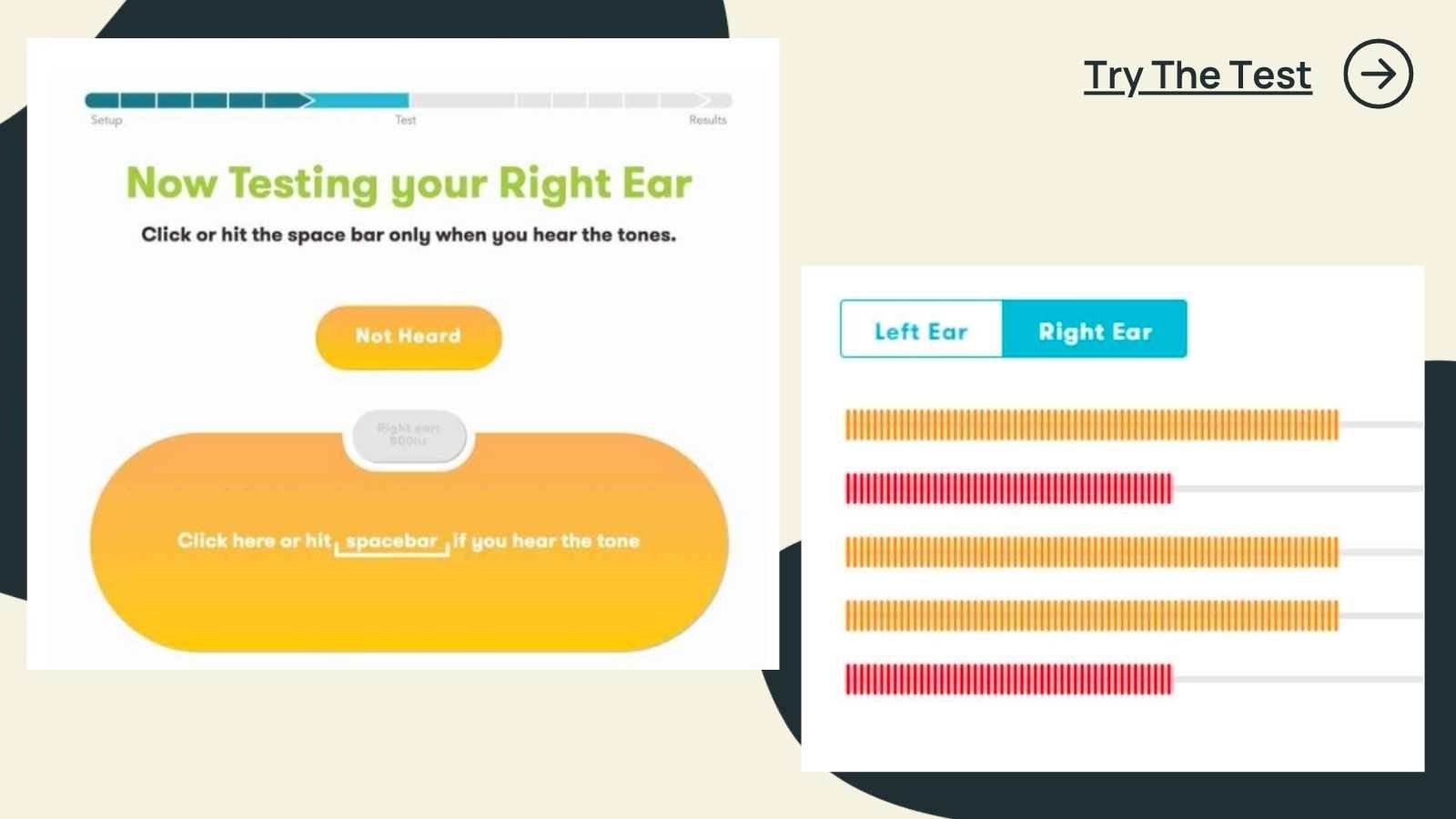
The Audicus test is more robust than most (takes 10-15 minutes) and was custom-built by their team of audiologists and neuroscientists over two years. The test has a simple user interface that asks the test taker to hit the space bar each time they hear a sound. The results do not include a traditional audiogram chart, but they do give good data on each ear, and the results were accurate compared to other tests.
Try The Audicus Test

#5. Mimi - Best Hearing Test App
We like the Apple and smart TV integrations
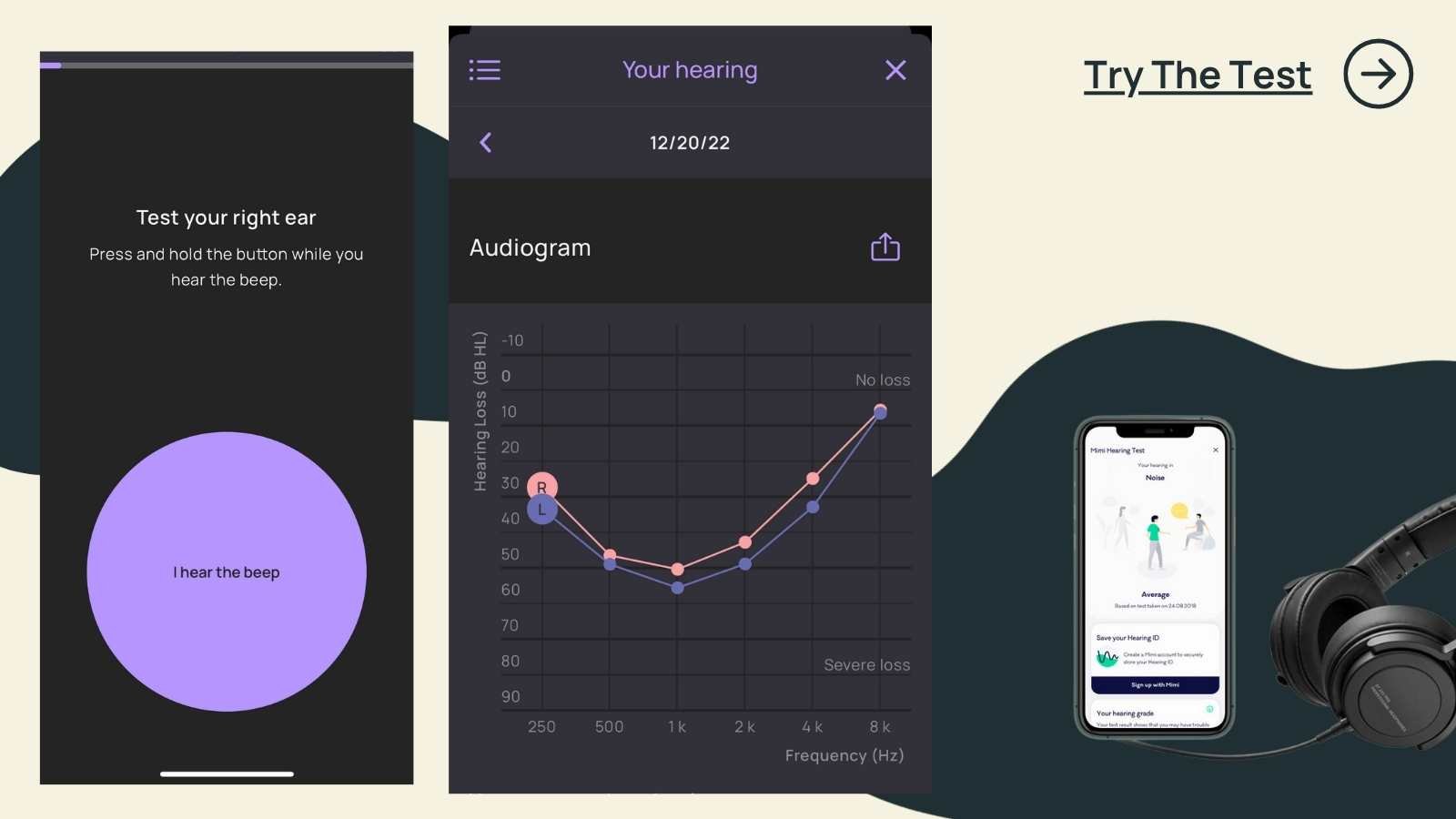
The Mimi hearing test is a smartphone app known for being both thorough and accurate, and it comes in two versions. The first version, called the Pure Tone test, involves playing a tone at various frequencies and asking the test taker to hold a button until they can no longer hear the sound.
The second version, called the Background Noise test, assesses hearing in the presence of background noise. In addition to its comprehensive testing options, Mimi also offers impressive integrations, such as the ability to adjust Apple Airpods to match hearing loss and to adjust the sound quality of smart TVs.
The drawback to Mimi is that the test is only available through a downloaded app on your IOS or Android smartphone.
Try The Mimi Test on Android and iPhone
Which Online Hearing Tests Actually Work?
Scroll through the internet and you’ll see dozens of hearing tests - but not all of them are worth your time. Here’s how to tell the helpful ones from the gimmicks so you don’t waste a minute.
Frequency Tests (“Ear Age” Tests)
These are the viral ones that tell you how “old” your ears are. They play a single high-pitched tone and give you a number. Fun, yes. Useful? Not really. They skip proper calibration, don’t test each ear on its own, and ignore background noise. Think of them as party tricks, not medical tools.
Pure Tone Tests
These are the best option online. Pure tone tests play sounds at different pitches and volumes in each ear - almost exactly what you’d get in a clinic. All five of our top picks use this method, which is why we trust them.
Speech-in-Noise Tests
Ever struggle to hear people in a noisy restaurant? These tests measure how well you pick out speech in background noise. They’re less common online, but can be a great extra check if you find one.
“If you only take one online test, choose a pure tone test — it’s the most reliable way to screen for hearing loss at home.” – Dr. Amy Sarow, AuD
That's a Wrap
We hope you've found this research useful!
Remember that an online hearing test can't fully replace a test from a doctor, but it can give you useful information to start your process.
If you want to learn more about how to read a audiogram hearing test, check out this breakdown from Dr. Amy Sarow.
Frequently asked questions
Generally yes. Online hearing tests mostly use the same underlying technology as tests administered at a local clinic. The majority of tests play a series of tones at varying frequencies. If you have a decent pair of headphones and a quiet room, you should be able to replicate a booth test closely.
It's worth noting that some more complex tests, like bone conduction testing and tympanometry, cannot be accessed online.
All leading online hearing tests that we reviewed are entirely free of charge. Most tests require an email address to access the final results.
Any good headphones should work well. Bose, Beats, Apple, Sony, Jabra, and others are typically suitable. Avoid cheap or disposable style headphones.
One note, if you've uploaded your audiogram to your AirPods through the Apple Health app, you should turn off personalized audio. More on that process here. If you aren't familiar with this feature, you likely have nothing to worry about.
With your results in hand, you can further research your hearing loss type. Look at our step-by-step crash course to finding the best hearing aids here.
Most people have sloping hearing loss (which gets worse at higher frequencies). You can compare your results to common hearing loss types here.
If you have mild-to-moderate hearing loss, you could be a good candidate for either prescription or over-the-counter hearing aids. If your hearing loss is severe, we suggest you find a local professional to fit you with prescription-level devices.
If you have specific questions, you can always get in touch with our team at [email protected].
Jabra and Audicus (listed above) can use your online hearing test results to program your hearing aids.
Most local audiologists will request an additional hearing test to verify your results before programming your hearing aids.
We tested more than 20 different online hearing tests from both hearing aid manufacturers and local clinics.
Many, including those from ReSound, Phonak, and Starkey, shared a key limitation: they didn’t provide users with a visual audiogram. Instead, they delivered a simple pass-or-fail or “hearing range” result.
While that approach may work as a quick screening tool, our research found that tests offering a visual chart of hearing thresholds were far more useful for consumers trying to understand their hearing profile and make informed product decisions.




